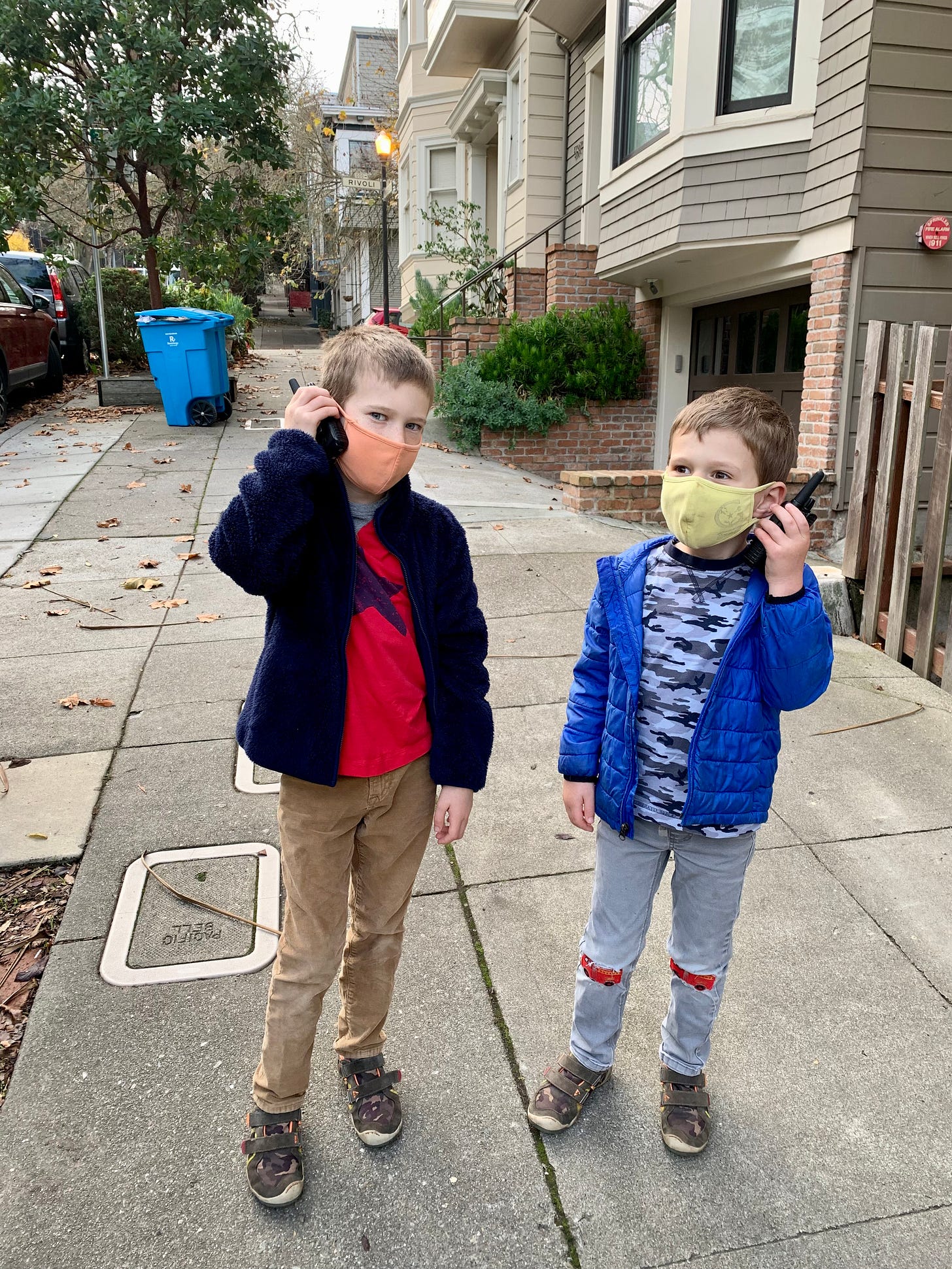When times get tough and the world seems bleak (like now), I double down on rituals.
I first learned about the power of rituals a few weeks into the coronavirus pandemic, when it became clear that our kids were not going back to preschool and first grade anytime soon. I remember looking at my husband and asking (rhetorically, I thought) how we were going to get through the days without completely losing our minds.
“We should be leaning into rituals right now,” he responded. “Apparently they’re very grounding.”
I looked at him through narrowed eyes. Did he really just suggest that the solution to our lack of childcare was to light a few candles? But, as with many things, he was right: as anthropologist Dimitris Xygalatas notes in Ritual: How Seemingly Senseless Acts Make Life Worth Living, “Ritual, as it turns out, can be as effective in reducing stress as some of our best anxiety medications.”1
The next morning, instead of just rolling directly from breakfast into our makeshift one-room schoolhouse (aka our dining room), we went for a ten minute walk around our neighborhood. We continued this family ritual, known as our “faux commute,” for the rest of the school year and during the following school year as well.2
Guess what? It was grounding.
According to my now-fifth grader, those morning walks when he was in first and second grades are among his most positive and lasting memories of the pandemic.
Feeling the need for grounding once again, I recently picked up The Power of Ritual: Turning Everyday Activities into Soulful Practices by
. It was published in June 2020, which for most books was not an ideal time to come out, but for this particular book might have actually been the perfect moment.Rituals, according to ter Kuile, share three ingredients: intention (being clear about what we’re inviting into the moment); attention (being present in the moment); and repetition (returning to the practice over and over).3
Instead of imploring us to shoehorn new rituals into our already overloaded schedules, ter Kuile invites us to bring awareness to our existing habits (even “micro-moments” such putting on sunscreen in the morning) and layer on the elements to make them more meaningful.
As he writes, “Spiritual growth doesn’t depend on doing more than the soul is probably already doing, but on doing the same things in a design instead of in a muddle.”4 In other words, by being practically deliberate, you can turn a habit into a ritual through intention and awareness.
What does that look like? The Power of Ritual highlights rituals across four levels of connection: 1) with yourself, 2) with the people around you, 3) with the natural world, and 4) with the transcendent.
I’ll share what each category of ritual currently looks like for me, with the hope that it might inspire you to create your own grounding rituals to help you navigate through uncertainty and upheaval.
Connecting with yourself
Journaling is my primary way of connecting with myself; I’ve kept a journal since I was eight years old. Studies have shown the positive effects of regular journaling; I’m convinced this practice helped me through some of the toughest times of my life, especially before I discovered therapy. Because I don’t have as much time to write as I did pre-kids, this One Line a Day 5-Year Journal has been a game-changer (I’m currently on my third one). Each night after I get into bed, I record something about my day, including at least one thing that I’m grateful for and/or that went well. This primes me to remember my day positively, even if other things went sideways. I love the added benefit of being able to look back in time at what happened on that day in past years.
Connecting with the people around you
Food is a connection enabler. We prioritize having dinner together as a family, and another ritual we started during the pandemic - which has been going strong for 3+ years now - is each sharing our daily rose (highlight), thorn (lowlight), and bud (what we’re looking forward to) over our meal every night. It’s a sneaky way of finding out what happened at school without asking directly (which typically elicits the response “nothing”). It also helps surface topics we might want to talk more about in our weekly family meeting on Sunday nights, another ritual that helps keep us grounded going into our hectic weeks.
Connecting with the natural world
As ter Kuile reminds us, the natural world “helps us rightsize our problems and ambitions, our losses and our longings.”5 Indeed, research has shown the numerous health benefits of “forest bathing,” immersing yourself in an area with trees. One way I rationalize San Francisco’s high cost of living is its ease of access to the natural world. From my home in the center of the city, I can walk seven minutes to a 61-acre open space reserve with multiple stunning hikes. While I love going on longer weekend hikes and visiting National Parks during school vacations, taking regular walks in my forest close to home has been a lifeline, especially these last few years. (I snapped the below selfie on a hike in my local forest the day before my book came out.)
Connecting with the transcendent
Even though ter Kuile’s writing is very accessible (as you’d expect from someone who started a podcast called Harry Potter and the Sacred Text), I’ll admit that this category was the hardest for me to relate to initially. But when ter Kuile noted that being part of a small group that meets regularly can be a powerful spiritual practice, something clicked. As ter Kuile writes, “a good small group is loving enough for us to be supported and held, but accountable enough to not let us get away with platitudes and easy answers.”6 I’ve been part of a women’s circle of Stanford Business School alumnae for nearly five years, and it’s been a major catalyst for my growth. Indeed, as I told the Wall Street Journal last year, this group asked me the tough questions that led me to quit my corporate job and repot my career.
Going for ritual BINGO
This past Friday, my family escaped to Tahoe for a screen-free long weekend (a practice we’ve never done before but we’ll absolutely repeat). I started writing this post before we left, and I finished it afterwards.
As I reviewed the four types of ritual connection, I realized that our weekend contained all of them, which is perhaps why it felt so grounding.
I read and I journaled, which helped me connect with myself. We played board games as a family, which helped us connect with each other. We hiked each day, which helped us connect with the natural world. And (speaking of practices we’ve never done before), we brought candles and challah with us and said the blessings over them on Friday night, which helped us connect with the transcendent.
We’ve leaned into lighting the Shabbat candles regularly as a family this last month. Until recently, it’s something we’ve done only intermittently at best, but in this time of growing antisemitism, I’ve felt drawn to observe this ritual that’s been practiced for thousands of years. After all, as ter Kuile reminds us, while “exploring new rituals and making up traditions can be fun and creative, it is the oldest and oft-repeated practices that hold the most meaning in the end.”
Abby’s Latest
One of my favorite nightly rituals is enjoying a square or two of dark chocolate after dinner. In my mind, a meal isn’t complete without a bite of chocolate at the end. My favorite dark chocolate bars are from Alter Eco (personally, I am partial to burnt caramel and quinoa crunch, but you really can’t go wrong).
I’m thrilled that the kind folks at Alter Eco provided me with a discount code to share with you. The code PRACTICALLY15 is good for 15% off sitewide through 11/1/24 (nearly one whole year!). The code can't be combined with other coupons, but you can get free shipping if you spend $75 or more. Why not split an order with a friend or two as a way of connecting with others?
Deliberately yours,
Abby
Xygalatas, Dimitris. Ritual: How Seemingly Senseless Acts Make Life Work Living. New York: Little, Brown Spark, 2022, 81.
Our kids didn’t return to full-time in-person school until the 2021-22 school year. And no, I don’t entirely know how we got through that time without completely losing our minds.
ter Kuile, Casper. The Power of Ritual: Turning Everyday Activities into Soulful Practices. New York: HarperOne, 2020, 26.
Ibid, 187.
Ibid, 134.
Ibid, 164.








